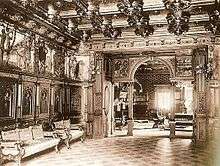Katia Mann
| Katia Mann | |
|---|---|
 Thomas and Katia Mann | |
| Born |
Katharina Hedwig Pringsheim July 24, 1883 Feldafing near Munich |
| Died |
April 25, 1980 (aged 96) Kilchberg, Zürich |
| Nationality | German |
| Spouse(s) | Thomas Mann |
| Children | Erica, Klaus, Golo, Monika, Elisabeth, Michael |
Katia Mann (born Katharina Hedwig Pringsheim; July 24, 1883 – April 25, 1980) was the youngest child and only daughter (among four sons) of the German Jewish mathematician and artist Alfred Pringsheim and his wife Hedwig Pringsheim, who was an actress in Berlin before her marriage. Katia was also a granddaughter of the writer and women's rights activist Hedwig Dohm. Her twin brother Klaus Pringsheim was a conductor, composer, music writer and music pedagogue, active in Germany and Japan. She married the writer Thomas Mann.
Life

Katia was born in Feldafing near Munich, into one of the wealthiest families in Germany. She was the granddaughter of German-Jewish industrialist Rudolf Pringsheim and the great-niece of the banker Hugo Pringsheim. At the age 21, in the fall of 1904, she aborted her studies of physics and mathematics on the request of her mother and aunt, to marry the writer Thomas Mann on February 11, 1905, in Munich. She continued her studies as a guest student for another four semesters. Katia and Thomas Mann had six children (see section "Children" infra). Katia later converted to her husband's Lutheranism.[1]
Children


| Name | Birth | Death |
|---|---|---|
| Erika | November 9, 1905 | August 27, 1969 |
| Klaus | November 18, 1906 | May 21, 1949 |
| Angelus ("Golo") | March 27, 1909 | April 7, 1994 |
| Monika | June 7, 1910 | March 17, 1992 |
| Elisabeth | April 24, 1918 | February 8, 2002 |
| Michael | April 21, 1919 | January 1, 1977 |
Issue
Katia Mann became ill in Autumn 1911, a year after Monika's birth. The illness was first suspected to be tuberculosis, but later X-ray examinations could not find any physical changes. Her mother, Hedwig, put the illness down to exhaustion. Katia had given birth to four children and suffered two miscarriages in less than five years. In addition, she typed for her husband and arranged his appointments on top of the tasks of a large household.[2] Hedwig realised that her daughter needed rest, and in January 1912, Katia was one of the first patients to be admitted to the Wald Sanatorium in Davos, Switzerland. Thomas Mann's visits to her there inspired his novel The Magic Mountain. Up to May, 1914, Katia spent several months in sanatoriums, which (according to her) strengthened her so that she could "stand it all".
As the Mann family lived in exile, Katia Mann took care of her six children and husband. She was not just the good spirit of the family, but the connection point that kept them all together. She taught her children, was her husband's manager, and was the family provider. She outlived three of her children (Klaus, Erika and Michael) and her husband. She died in Kilchberg near Zürich.
Thomas Mann made a sort of "portrait" of her in his novel Royal Highness.
See also
Notes
- ↑ Kurzke, Hermann (2002). Thomas Mann: Life as a work of art: A biography. Princeton, New Jersey: Princeton University Press. ISBN 0691070695.Translation by Leslie Willson of Thomas Mann: Das Leben als Kunstwerk (München C. H. Bick'sche Verlagsbuchhandlung, 1999).
- ↑ Andert, Karin (1910). Monika Mann, Eine Biografie. Hamburg: Mare Verlag,
re-issued (1912), Munich: Piper Verlag. ISBN 9783492272285.
References
- Michael Mann (editor): Katia Mann: My Unwritten Memoirs. (Katia Mann: Meine ungeschriebenen Memoiren.) S.Fischer, Frankfurt 1974, ISBN 3-10-046701-9; Fischer-Taschenbuch-Verlag, Frankfurt 2000, ISBN 3-596-14673-9
- English edition: Katia Mann: Unwritten Memories, edited by Elisabeth Plessen and Michael Mann, translated by Hunter and Hildegarde Hannum. Alfred A. Knopf, 1975. ISBN 978-0-394-49403-6
- Inge and Walter Jens: Mrs. Thomas Mann. The life of Katharina Pringsheim. (Frau Thomas Mann. Das Leben der Katharina Pringsheim.) Rowohlt. Reinbek, 2003. ISBN 3-498-03338-7
- Kirsten Jüngling / Brigitte Roßbeck: Katia Mann. The Wizard's Wife. (Katia Mann. Die Frau des Zauberers.) Propyläen. 2003. ISBN 3-549-07191-4
External links
 Media related to Katia Mann at Wikimedia Commons
Media related to Katia Mann at Wikimedia Commons